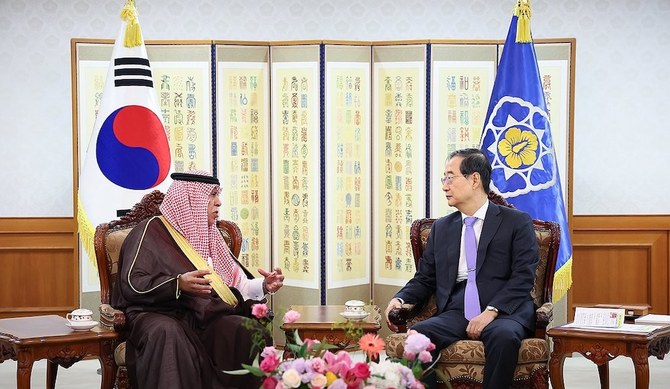RIYADH: Trade ties in light of the free trade agreement between the Gulf Cooperation Council and South Korea were discussed when a leading Saudi minister met the East Asian country’s prime minister.
As part of his three-day visit to the republic, Saudi Minister of Commerce Majid Al-Qasabi held talks with Han Duck-soo in Seoul.
An FTA between South Korea and the GCC was signed in December 2023, with the East Asian nation agreeing to remove tariffs on almost 90 percent of all items, including liquefied natural gas and other petroleum products.
GCC countries agreed to abolish levies on more than 76 percent of products across 18 chapters

Commerce Minister Majid Al-Qasabi was leading a Saudi delegation on a three-day visit to Seoul to bolster trade ties with Korea. X/@malkassabi
Discussing the meeting with the Korean prime minister in a post on his X account, Al-Qasabi said: “We discussed the progress made in the negotiations of the Free Trade Agreement between Korea and the Gulf Cooperation Council countries, as well as promising partnership opportunities at both the governmental and private levels.”
The Saudi commerce minister has traveled to South Korea as part of a delegation featuring representatives from 10 government entities and 55 senior business leaders and executives from major national companies.
Taking place from July 29 to 31, the visit’s objectives include facilitating greater economic activities between the Kingdom and the East Asian country, as well exploring promising opportunities for collaboration.
A key part of the assemblage is participating in the Saudi-Korean Business Forum, which allows both nations to discuss and expand partnerships. Enhancing trade exchange between the two countries remains a primary goal of this delegation.

Saudi Minister of Commerce Majid Al-Qasabi meets South Korean Minister of Small and Medium-Sized Enterprises and Startups Oh Young-ju. (Yonhap)
According to the ministry’s data, cumulative trade between the two nations reached SR554 billion ($147.6 billion) between 2019 and 2023, with the annual value of commerce increasing from SR93.6 billion to SR129.8 billion over the period.
During the visit, the Korean Minister of Small and Medium-Sized Enterprises and Startups Oh Young-ju met with Al-Qasabi and other delegation members to discuss establishing a policy consultative body.
The Korean ministry discussed the outcomes of bilateral cooperation with the Saudi ministry, focusing on SMEs and startups, aiming to explore pathways for joint growth and collaboration, according to Yonhap News Agency.
“We reviewed the economic reforms in Saudi Arabia, explored partnership opportunities in emerging fields, and discussed business incubator programs and innovation centers,” Al-Qasabi said.

Saudi-Korean economic ties have been further strengthened by venture capital and startup collaborations. X/@malkassabi
“We also talked about expanding e-commerce cooperation in the Kingdom, knowledge transfer, exchanging specialized expertise and talents, and establishing training programs for Saudi students,” he added.
The Korean government also urged the Kingdom’s ministry to support and facilitate increased participation of companies from the East Asian country in the upcoming Saudi-based startup festival, Biban 2024, scheduled for November.
Saudi Arabia is currently ranked seventh among Korea’s trade partners, with non-oil exports to the country amounting to SR4.5 billion.
Saudi-Korean economic ties have been further strengthened by venture capital and startup collaborations, such as the Kingdom’s Wa’ed Ventures recently investing $15 million in the South Korean chipmaker Rebellions.

Cumulative trade between Saudi Arabia and South Korea reached $147.6 billion between 2019 and 2023. X/@malkassabi
Al-Qasabi’s visit to the country is the latest in a move to boost economic trade and strengthen partnerships with Asian nations.
In May, the minister led a delegation representing 20 government bodies and 24 private sector entities to Malaysia, where a business council was launched.
In July, the Kingdom also strengthened its economic relations with Thailand as it opened its first Board of Investment office in Riyadh.

The Saudi commerce minister has traveled to South Korea as part of a delegation featuring representatives from 10 government entities and 55 senior business leaders. X/@malkassabi
During a business forum, the Saudi Minister of Investment Khalid Al-Falih said it marked Thailand’s inaugural office in the Middle East, encouraging stronger bonds and new investment opportunities in both countries.
Saudi and China relations have also seen a boost this year as officials from both nations held a roundtable meeting in May.
Saudi Finance Minister Mohammed Al-Jadaan led the talk and emphasized the depth of the bilateral relationship between the two nations, highlighting the trust and ongoing collaboration across diverse sectors.

































